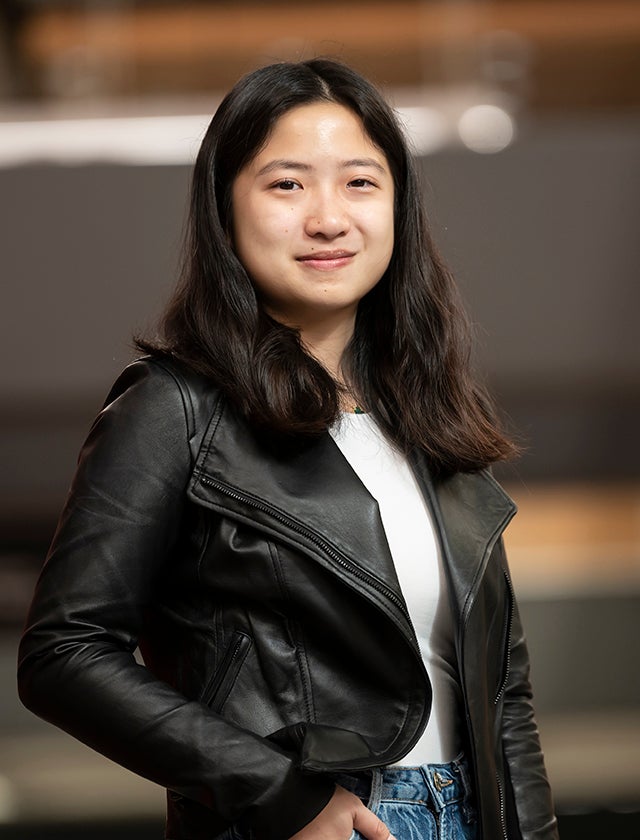
Subscribe to Pittwire Today
Get the most interesting and important stories from the University of Pittsburgh.A change-maker who landed a red carpet role.
Most people would not want to relive their teenage years — the social pressure, the identity quandaries, the fears, not to mention the hormones.
But that’s what Pitt student Isabel Lam did for a Disney+ documentary series called “Growing Up,” which highlights 11 young “heroes” as they reflect on inspiring journeys of self-acceptance and activism. Lam and her best friend, Clare, are the subjects of Episode 2. The duo reenacted high school experiences in Clarks Summit, Pennsylvania, including scenes of their joint work fighting period poverty.
In 2018, Lam and Clare were shocked to read online about how nearly half the United States and most of the world still impose a luxury tax on period products, and 1 in 4 U.S. students who menstruate cannot afford period products. The friends decided to do something about it. They founded a local chapter of Period., a national organization dedicated to eradicating period poverty and stigma.
For them, it was a risky move at an age when everyone wants to fit in.
“I was the quiet shy girl. People were surprised I would do something so bold,” Lam says.
The two faced pushback at first.
“People would say, ‘That’s so gross,’ and ‘Don’t talk about it,’” Lam recalls. “We felt hopeless at times.”
The girls persisted, made posters and recruited their friends. They spoke at high schools throughout Pennsylvania, organized a rally in Philadelphia and successfully lobbied the government to provide free menstrual products to schools statewide. Their local group grew to more than 100 members of all genders.
The documentary creatively illustrates their success in dismantling stigma with a fun dance scene: The two girls, surrounded by a pack of friends, boogie down a school hallway with a cart full of tampons and pads.
Their trailblazing efforts caught the attention of “Captain Marvel” star Brie Larson, who was inspired to create the “Growing Up” series when reckoning with her own shames, including “fears around menstruation,” she told ABC Entertainment News.
The 25-minute episodes explore the heroes’ personal challenges, too, like Lam’s struggles growing up in a small town that lacked racial diversity. As a young girl, she felt embarrassed when her parents spoke their first language in public, and she didn’t try to learn it herself. Then, around the same time she was making courageous moves in period advocacy, her grandparents in Fuzhou, China, became ill. Lam felt a sudden urgency to learn more about Chinese culture and language to better communicate with them before it was too late.
“I didn’t want to regret that I was never able to have conversation with them,” she says. “And I’d always felt like something was missing in my identity.”
Lam enrolled at the University of Pittsburgh after high school graduation and suddenly didn’t feel so alone, discovering thousands of others with a similar cultural background to hers on campus. She found opportunities to embrace her heritage, including joining the Asian Student Alliance and Chinese American Student Association (CASA) and taking Mandarin classes. Professor Bei Cheng, who taught Lam’s first-year Chinese courses, remembers how Lam would linger after class, ask questions and share stories about her upbringing.
“Isabel is easy to connect with and curious about other peoples’ lives,” says Cheng, who calls Lam a friend and subscribed to Disney+ just to watch her starring role.
Now Lam can chat with her grandparents without her mother translating. And she feels much happier with a greater connection to her heritage.
As a political science and economics major, Lam continues to advocate for period equity and is launching a chapter of Period. on Pitt’s campus (Cheng is the faculty advisor).
As for growing up, Lam has learned that it’s universal.
While filming the documentary over two weeklong intensive sessions in New York City, Lam bonded with the other featured heroes, all of whom have overcome their own obstacles like disability, struggles with sexual and gender identity, and homelessness. The new friends realized they shared many similar feelings even if the circumstances were different.
“Growing up, you feel so alone and confused trying to find yourself,” Lam says. “But later you learn that many others have felt those things, too. You’re never alone.”
— Liberty Ferda



